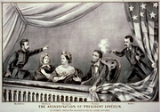
An assassination may be prompted by religious
, ideological
, political
, or military
motives; it may be carried out for the prospect of financial gain
, to avenge
a grievance, from the desire to acquire fame or notoriety (that is, a psychological need to garner personal public recognition
), from the wish to form some kind of "relationship" with a public figure, or from the desire (or at least the willingness) to be killed or commit suicide in the act.
The word assassin is derived from the word Hashshashin
(Arabic: حشّاشين, ħashshāshīyīn, also Hashishin, Hashashiyyin, or Assassins), and shares its etymological roots with hashish
(icon or ˈ; from Persian
: ).
41 Gaius Caesar (Caligula), known for his eccentricity and cruel despotism, is assassinated by his disgruntled Praetorian Guards. Claudius succeeds his nephew.
193 Roman Emperor Pertinax is assassinated by Praetorian Guards, who then sell the throne in an auction to Didius Julianus.
193 Roman Emperor Didius Julianus is assassinated.
1082 Ramon Berenguer II, Count of Barcelona is assassinated.
1127 Assassination of Charles the Good, Count of Flanders.
1192 Assassination of Conrad of Montferrat (Conrad I), King of Jerusalem, in Tyre, two days after his title to the throne is confirmed by election. The killing is carried out by Hashshashin.
1462 Vlad III the Impaler attempts to assassinate Mehmed II (The Night Attack) forcing him to retreat from Wallachia.
1567 An explosion destroys the Kirk o' Field house in Edinburgh, Scotland. The second husband of Mary, Queen of Scots, Lord Darnley is found strangled, in what many believe to be an assassination.
1570 The assassination of regent James Stewart, 1st Earl of Moray throws Scotland into civil war.
1584 William I of Orange is assassinated in his home in Delft, Holland by Balthasar Gérard.

